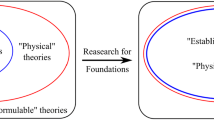Abstract
What justifies the allocation of funding to research in physics when many would argue research in the life and social sciences may have more immediate impact in transforming our world for the better? Many of the justifications for such spending depend on the claim that physics enjoys a kind of special status vis-a-vis the other sciences, that physics or at least some branches of physics exhibit a form of fundamentality. The goal of this paper is to articulate a conception of fundamentality that can support such justifications. I argue that traditional conceptions of fundamentality in terms of dynamical or ontic completeness rest on mistaken assumptions about the nature and scope of physical explanations.
Access this chapter
Tax calculation will be finalised at checkout
Purchases are for personal use only
Similar content being viewed by others
Notes
- 1.
If late twentieth-century philosophy of science showed us anything, it showed us that at every stage, from the selection of research projects for funding, to the way evidence is seen to bear on hypotheses to what gets published in journals to finally which results get translated into practice and policy, science is influenced by a community’s values. As there is no way to avoid this influence then, we might as well make sure that science is guided in its practices by the values we actually endorse [4, 5].
- 2.
Note, in this essay, I speak of non-fundamental entities as those that are derivative, rather than those that are emergent. The meaning of ‘emergence’ is contested in the philosophical literature, as much as the concept of fundamentality is. But there is a long tradition of viewing emergent entities as those that, while they may depend for their existence on fundamental entities and arise out of the behavior of those entities, are also fundamental themselves. This is so because their existence is not derivable or explainable by anything else, however much their existence may be triggered by a certain arrangement of physical matter [1, 6]. This is why the view that phenomenal consciousness is an emergent phenomenon is typically regarded as a version of dualism, rather than physicalism. It is the view that there are two basic kinds of fundamental phenomena: physical phenomena and consciousness.
- 3.
- 4.
Kim [3].
- 5.
Teller [9].
- 6.
Note: the claim in the text is not that we have good reason to think we won’t reach an explanatorily complete physical theory. The claim is only that there is no good argument in support of the claim that there will ever be an explanatorily complete physical theory, and so we shouldn’t hang the status of physics as fundamental on this assumption.
- 7.
Of course, inductive arguments are fallible. And so even when we have narrowed in on a common kind, there is no guarantee that what has so far been observed to hold of the kind will in fact hold for all members in the future. But at least in such cases, we have a basis from which to gain some inductive support for the conclusion.
- 8.
- 9.
As cited in the American Institute of Physics document “Reminding Congress that basic research pays off.” https://www.aip.org/commentary/reminding-congress-basic-research-pays.
- 10.
Although it does not tie directly to the issue of fundamentality, physics organizations do appeal to other justifications. When addressed to sources of government funding, appeals are also made to the values of achieving gains in national security and dominance. Historians of physics (e.g. [8]) have documented the Reagan administration’s enthusiastic support for the doomed Superconducting Supercollider project as a means of establishing U.S. dominance in particle physics. In addition, physical societies often appeal to the benefits of supporting researchers in universities who will train a nation’s scientists and engineers, thus ensuring a strong national workforce and economy. The British Institute of Physics (IOP), for example, issued several statements in 2017 on “the role of physics in supporting economic growth and national productivity.” http://www.iop.org/publications/iop/2017/page_69224.html.
- 11.
U.S. trends are well documented by the American Association for the Advancement of Science at: https://www.aaas.org/page/historical-trends-federal-rd. Another indication of the present threat to physics funding is U.S. President Donald Trump’s 2018 proposed budget. This includes a decrease of 18.4% to the Department of Energy’s high energy physics program and a cut of 19.1% to nuclear physics. The budget slashes funding of basic science at the National Science Foundation (NSF) by 13%. http://www.sciencemag.org/news/2017/05/what-s-trump-s-2018-budget-request-science.
References
Barnes, E.: Emergence and fundamentality. Mind 121(484), 873–901 (2012)
French, S.: The Structure of the World: Metaphysics and Representation. Oxford University Press (2014)
Kim, J.: Why There are no laws in the special sciences. In: Essays in the Metaphysics of Mind. Oxford University Press (2010)
Kitcher, P.: Science, Truth, and Democracy. Oxford University Press (2001)
Longino, H.: Science as Social Knowledge. Princeton University Press (1990)
McLaughlin, B.: The rise and fall of british emergentism. In: Beckermann, A., Flohr, H., Kim, J. (eds.) Emergence or Reduction? Prospects for Nonreductive Physicalism. De Gruyter (1992)
Ney, A., David, Z.A.: The Wave Function: Essays in the Metaphysics of Quantum Mechanics. Oxford University Press (2013)
Riordan, M.: The demise of the superconducting super collider. Phys. Perspect. 2(4), 411–425 (2000)
Teller, P.: An Interpretative Introduction to Quantum Field Theory. Princeton University Press (1995)
Author information
Authors and Affiliations
Corresponding author
Editor information
Editors and Affiliations
Rights and permissions
Copyright information
© 2019 Springer Nature Switzerland AG
About this chapter
Cite this chapter
Ney, A. (2019). The Politics of Fundamentality. In: Aguirre, A., Foster, B., Merali, Z. (eds) What is Fundamental?. The Frontiers Collection. Springer, Cham. https://doi.org/10.1007/978-3-030-11301-8_4
Download citation
DOI: https://doi.org/10.1007/978-3-030-11301-8_4
Published:
Publisher Name: Springer, Cham
Print ISBN: 978-3-030-11300-1
Online ISBN: 978-3-030-11301-8
eBook Packages: Physics and AstronomyPhysics and Astronomy (R0)




